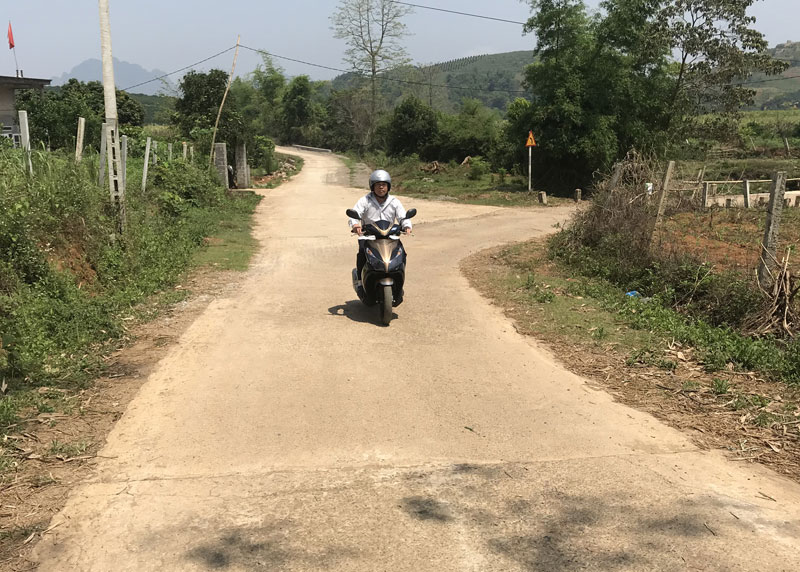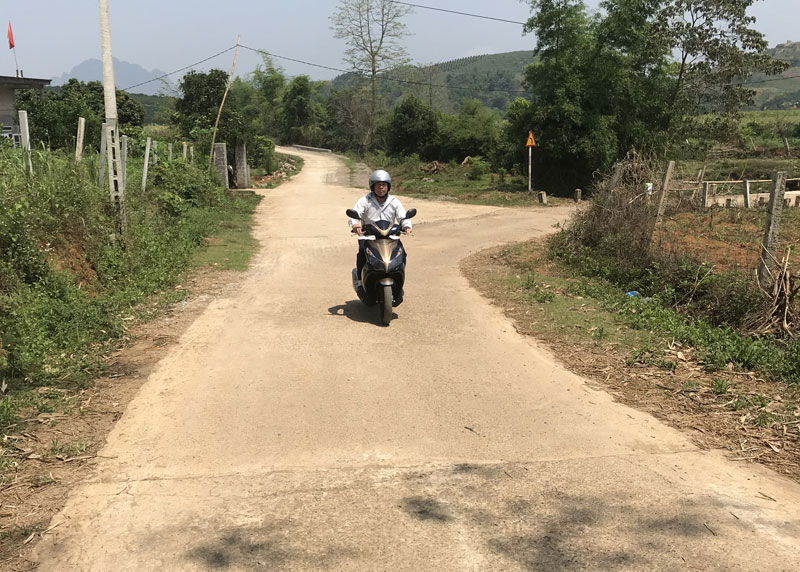
(HBO) – Dong Phong commune in Cao Phong district, the northern mountainous province of Hoa Binh, has emerged from a commune facing various difficulties to become locality completing 19 criteria set for a new-style rural area.

Residents of Quang Ngoai hamlet, Dong
Phong commune, Cao Phong district, donate more than 6,000 sq.m of residential
and production land to build rural roads and infrastructure facilities.
During the implementation of the
resolution of the 28th congress of the communal Party Committee, Dong Phong has
encouraged locals to contribute nearly 1,300 workdays. A total of 268
households have donated over 8,000 sq.m of land, along with many assets and
constructional materials, to build roads and infrastructure facilities. The
most outstanding contributors are from Chang Trong, Chang Ngoai, Quang Trong
and Quang Ngoai hamlets.
Bui Van Doan, Secretary of the Party
Organisation of Quang Ngoai hamlet, said more than 50 households in the hamlet
have donated 6,000 sq.m of residential and production land to build roads and
other infrastructure facilities.
The construction and land donation have
been publicised by the communal authorities and the hamlet’s management board
under the supervision of the people’s inspection board.
This method helps raise public trust in
the Party leadership, while helping improve the awareness and the sense of responsibility
of each individual for new-style rural area building.
Locals have directly contributed opinions
to the construction plan. Over the past seven years, they have contributed 10
billion VND worth in cash and worth of workday, land, property and construction
materials, or 17.6 percent of the total cost of the construction.
Thanks to the joint efforts, Dong Phong
commune has been given a facelift. Over 77 percent of roads connecting villages
in the commune have been concretised and more than 83 percent of canals have
been consolidated. All households in the commune have accessed regular and safe
power lines. Two thirds of schools in the commune have satisfied set standards.
All hamlets and villages have cultural houses. The communal medical centre has
been qualified and more than 95 percent of local residents have participated in
health insurance. The number of poor households dropped by 10.6 percent as
compared with 2011 and the average income per capita hits 26 million VND
annually (up 10.1 million VND against 2011).
The upgraded infrastructure system has
contributed to spurring local socio-economic development, especially the shift
of crop structure. Currently, the commune has 118 ha of citrus trees of
high-economic values./.
The emulation movement "Hoa Binh joining hands to build new-style rural areas” has been widely spreading, becoming a driving force that motivates the localities to renew rural landscapes and improve the material and spiritual lives of the residents. In this movement, the people play a central role-both as the main implementers and direct beneficiaries of its outcomes.
In response to the global digital revolution, Hoa Binh Newspaper is transforming itself into a modern and multi-platform media hub, blending cutting-edge technology with a restructured newsroom and a new generation of tech-savvy journalists.
Hoa Binh province’s Association of the Elderly recently held a conference to review the project on expanding the inter-generation self-help club model until 2025.
In a move to implement Resolution No. 57-NQ/TW, issued on December 22, 2024 by the Politburo, which targets breakthroughs in science-technology development, innovation, and digital transformation, the Hoa Binh provincial Department of Health has issued a plan to roll out the "Digital Literacy for All” campaign within the local health sector.
An Nghia Commune (Lạc Sơn District) is one of the communes that achieved the tha standard of the national new rural area in 2018. Entering a new development phase, the commune is now trying to meet the criteria for the advanced new rural development. With the strong political will and the public consensus, the commune is gradually overcoming the challenges to reach this goal, aiming for the sustainable development.



